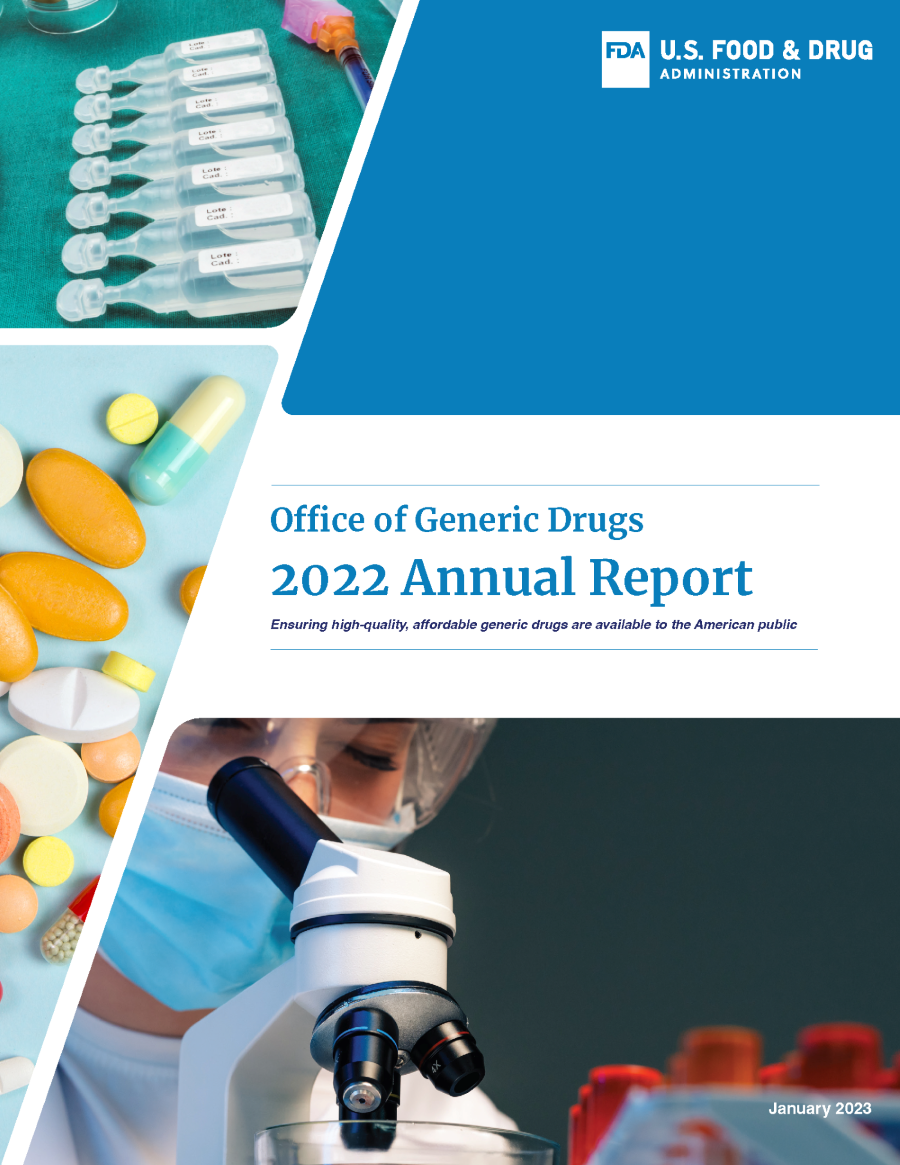Office of Generic Drugs 2022 Annual Report
Ensuring high-quality, affordable generic drugs are available to the American public
Office of Generic Drugs 2022 Annual Report (PDF - 6 MB)
In 2022, generic drugs remained a significant public health priority for the FDA. Competition from generic drug makers helped make drugs more widely available and generally less expensive, allowing millions of patients to access the medicines they need more easily. The approval of generics often means that there are multiple manufacturers for a drug product, which also helps stabilize the supply of medicines and reduces the risk of drug shortages. It is estimated that 91% of all prescriptions in the United States are filled as generic drugs, with more than 32,000 generic drugs approved by the FDA to date.
The Office of Generic Drugs (OGD) Annual Report provides a summary of OGD’s activities and accomplishments during the year including generic drug approvals, first generic drug approvals, the renewal of the Generic Drug User Fee Amendments, OGD scientific research, COVID-19 related work, and other activities that supported generic drug development and patient interests.
Table of Contents
- Director’s Message
- 2022 Generic Drugs Program At-A-Glance
- 2022 Highlights
- Regulatory Science Research
- Consistently and Efficiently Evaluating Generic Drugs and Monitoring Generic Drug Safety
- Advancing Bioequivalence and Generic Drug Assessments
- Policies that Support the Efficient Development of Safe, Effective, High-Quality, and more Affordable Generic Drugs
- The FDA Generic Drug Program – A Special Thank You to Our Collaborators
- Appendix
- Resources
Director’s Overview
Generic drug competition ultimately generates billions of dollars in savings each year for consumers and our health care system over higher-priced brand-name drugs. For example, a recent FDA study showed the savings accrued during the first year after approval for new generic drugs approved in 2018, 2019, and 2020 to be approximately $53.3 billion. This means tens-of-billions of dollars were saved each of those years, economy-wide, from new generic approvals.1 Generic drug competition offers tremendous public health benefits for the United States by helping to lower drug prices and improve access to needed medicines for American patients.
The Renewal of the Generic Drug User Fee Amendments
Congress enacted the Generic Drug User Fee Amendments (GDUFA) in 2012 to ensure patients have affordable access to safe, effective, high-quality generic drugs, and reauthorized the third iteration of GDUFA this year. Since its enactment, GDUFA implementation has supported the development of generic drugs, including complex generic drugs, which can raise unique scientific and regulatory considerations. GDUFA formalized funding for a regulatory science program that addresses scientific challenges that delay access to complex generics. Enhancements made to GDUFA over time have been specifically designed to foster the development, assessment, and approval of these complex products. Funding from GDUFA expands FDA capabilities to conduct robust assessments of generic drug applications, facilitating timely access to generic medicines. The enactment of GDUFA I and the first renewal with GDUFA II were each transformative for the generic drug program.
The implementation of FDA’s commitments under GDUFA III, which went into effect on October 1st, 2022, are bringing the program to yet another level. It will build on the successes of the GDUFA I and GDUFA II programs, with a focus on reducing the number of assessment cycles to advance earlier approvals and promote the timely availability of generic medicines. In the 10 years since it was enacted, GDUFA has helped strengthen and diversify the pipeline of generic drug applications reviewed by FDA.
Scientific Research: Helping to Increase Access to Complex Generic Drugs
FDA and OGD again made significant progress on efforts to advance scientific research. This research helps to ensure that regulatory standards, recommendations, and decisions are based on the most current scientific evidence. The GDUFA Science and Research Program is particularly important for pharmaceutical products known as complex products, which are harder to develop as generics. Complex products often have few or no generics, and drugs without competition may be too expensive for some patients to afford.
Abbreviated New Drug Application (ANDA), First Generics, Drug Competition Actions
In 2022, we continued to help increase competition by approving or tentatively approving 914 ANDAs, including 106 first generics. In one example, FDA approved the first generic cyclosporine ophthalmic emulsion, 0.05% (referencing Restasis), a drug which helps millions of patients in the United States who suffer from dry eyes.
Beyond directly approving generic drug applications, OGD continued its implementation of FDA’s Drug Competition Action Plan (DCAP). Notable deliverables include the October 2022 publication of draft guidances and product-specific guidances that provided recommendations for physicochemical and structural characterization tests, in vitro release test (IVRT) studies, and in vitro permeation test (IVPT) studies for topical generic drug products. Other publications included draft and final guidances and MAPPs that also help to ensure current and prospective ANDA applicants have the information they need to successfully submit high-quality ANDAs and to take advantage of the newly implemented GDUFA III commitments, including increased opportunities for meetings and other interactions with applicants.
Expanding Access to COVID-19 Drug Treatments
In 2022 we continued efforts to identify and accelerate the assessment of applications for generic drugs critical to the treatment of patients with COVID-19. Since the pandemic began, we have approved more than 1,850 COVID-19-related ANDA submissions, including applications for life-saving medications used to assist mechanically ventilated COVID-19 patients. Even with a continued focus on addressing the COVID-19 public health emergency, the generic drug program completed assessments of hundreds of original approvals and thousands of supplements for products not related to COVID-19. We also continued to identify science and research priorities to address scientific challenges which created opportunities for scientific advancement in the development of generic drugs, while concurrently devoting significant time and effort to facilitate the reauthorization of the Generic Drug User Fee Amendments.
Altogether in 2022, FDA’s generic drug program engaged in many efforts to steadily improve generic drug access. The FDA’s Office of Generic Drugs’ 2022 Annual Report provides a comprehensive look at what we accomplished and illustrates how OGD is well-positioned to continue its critical work in 2023.
Susan Rosencrance, Ph.D.
Acting Director, Office of Generic Drugs



